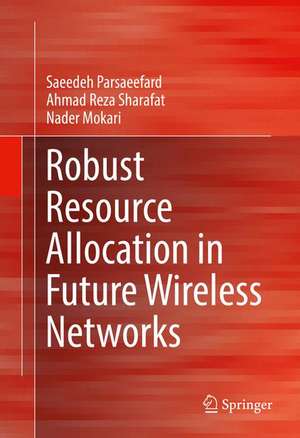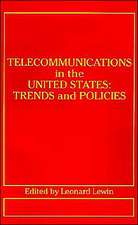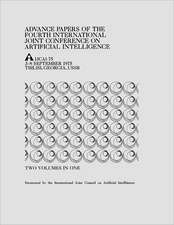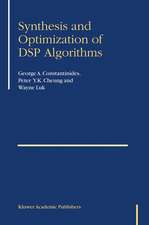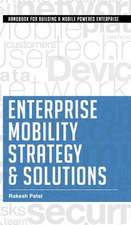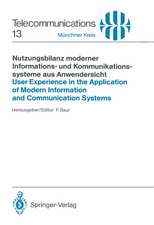Robust Resource Allocation in Future Wireless Networks
Autor Saeedeh Parsaeefard, Ahmad Reza Sharafat, Nader Mokarien Limba Engleză Hardback – 12 mar 2017
| Toate formatele și edițiile | Preț | Express |
|---|---|---|
| Paperback (1) | 888.31 lei 6-8 săpt. | |
| Springer International Publishing – 20 iul 2018 | 888.31 lei 6-8 săpt. | |
| Hardback (1) | 894.34 lei 6-8 săpt. | |
| Springer International Publishing – 12 mar 2017 | 894.34 lei 6-8 săpt. |
Preț: 894.34 lei
Preț vechi: 1090.66 lei
-18% Nou
Puncte Express: 1342
Preț estimativ în valută:
171.13€ • 179.13$ • 142.44£
171.13€ • 179.13$ • 142.44£
Carte tipărită la comandă
Livrare economică 31 martie-14 aprilie
Preluare comenzi: 021 569.72.76
Specificații
ISBN-13: 9783319503875
ISBN-10: 3319503871
Pagini: 245
Ilustrații: XIV, 245 p. 25 illus., 21 illus. in color.
Dimensiuni: 155 x 235 x 16 mm
Greutate: 0.54 kg
Ediția:1st ed. 2017
Editura: Springer International Publishing
Colecția Springer
Locul publicării:Cham, Switzerland
ISBN-10: 3319503871
Pagini: 245
Ilustrații: XIV, 245 p. 25 illus., 21 illus. in color.
Dimensiuni: 155 x 235 x 16 mm
Greutate: 0.54 kg
Ediția:1st ed. 2017
Editura: Springer International Publishing
Colecția Springer
Locul publicării:Cham, Switzerland
Cuprins
Chapter 1. Introduction.- Chapter 2.Robust Cooperative Resource Allocation.- Chapter 3. Robust Non-Cooperative Resource Allocation.- Chapter 4.Non-Convex Robust Problems.- Chapter 5.Conclusions and Future Research.
Textul de pe ultima copertă
This book presents state-of-the-art research on robust resource allocation in current and future wireless networks. The authors describe the nominal resource allocation problems in wireless networks and explain why introducing robustness in such networks is desirable. Then, depending on the objectives of the problem, namely maximizing the social utility or the per-user utility, cooperative or competitive approaches are explained and their corresponding robust problems are considered in detail. For each approach, the costs and benefits of robust schemes are discussed and the algorithms for reducing their costs and improving their benefits are presented. Considering the fact that such problems are inherently non-convex and intractable, a taxonomy of different relaxation techniques is presented, and applications of such techniques are shown via several examples throughout the book. Finally, the authors argue that resource allocation continues to be an important issue in future wireless networks, and propose specific problems for future research.
Caracteristici
Explains various applications for robust optimization theory in wireless networks;
Describes different approaches for reducing the costs of introducing robustness for allocating resources in wireless networks;
Presents advanced mathematical tools for solving NP-hard and intractable robust non-convex optimization problems;
Provides an overview of potential applications of robust techniques for resource allocation in future wireless networks.
Includes supplementary material: sn.pub/extras
Describes different approaches for reducing the costs of introducing robustness for allocating resources in wireless networks;
Presents advanced mathematical tools for solving NP-hard and intractable robust non-convex optimization problems;
Provides an overview of potential applications of robust techniques for resource allocation in future wireless networks.
Includes supplementary material: sn.pub/extras
